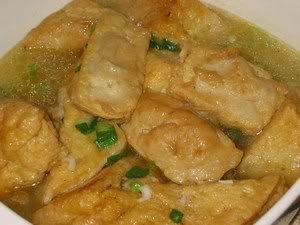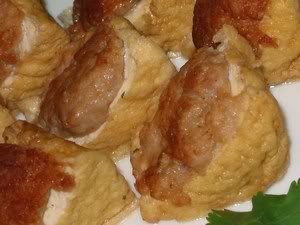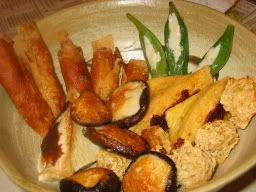
Tofu/taufoo, however you call it or in whatever forms is my favorite staple which needs no introduction but just for reminiscing, i miss the tofu from Malaysia, - the 'sang far', 'sui tofu' and 'tau khon/taukuah'.
To 'yeong' in cantonese which means to stuff, Besides all forms of tofu or soy products, any vegetables can be stuffed. Leafy vegetables like 'kangkong' or 'choy sum' can be blanched and twirled up and then a patch of fish paste is added. Blanched Long Beans made into a small bundle is one of the best. The other popular candidates for stuffing are 'red and green peppers', 'fu chuk', okra, eggplant and all types tofus of course. I personally like to stuff 'shitake mushrooms' and cabbage.
The stuffing filling of just fish paste is the most common but the 'hakka' version of adding ground pork and salted fish is very flavorful especially with 'sang far' tofu. In the absence of 'sang far', the silken tofu is cut into squares and using a melon baller, scoop a hole to hold the filling and then steam or alternatively, cut the tofu into triangles and stuff the fish paste on the pointed side of triangle instead of the straight side which is too tricky.
The paste can be made into balls which are then cooked in simmering water/stock or made into a log/disk and pan-fried.
The stuffed tofus or vegetables are pan-fried or deep-fried and is served as is with chilly sauce for dipping. They can be served with a light thin sauce made with 'mein see/tau cheong' or in soups. i especially like the soup that is made with soya beans. At this stage, they can be kept in the freezer but not for the stuffed white silken tofu. They are the best accompaniment for noodles.
1-1½ lb Spanish Mackerel fillet - using a spoon, remove the flesh from the skin
A
1/4 tsp white pepper
1/2 tsp sesame oil
1/4 tsp white pepper
1/2 tsp sesame oil
1 tsp light soya sauce
1/2 tsp sugar
1 egg white
a pinch of msg(optional)
B
2 tbsp cornstarch
1 tsp salt mixed with 4 tbsp water
1 tsp salt mixed with 4 tbsp water
Method:
Put the fish fillet in the food processor and pulse until the fish is finely chopped up. The number of pulses depend on the freshness of the fish meat.
Remove from food processor and put minced fish meat in the cake mixer mixing bowl.
Add in the seasonings A and using the paddle, mix to combine
Add in B and turn on the highest speed to create 'kau' , then the paste will have the good crunchy texture
The paste is ready to 'yeong'/stuff whatever.
For Hakka version -
Add to fish paste
1/2 lb of ground pork with considerable amount of pork fat and make sure that it is not ground too fine. The best would be to chop pork with the cleaver
Salted fish - preferably 'mui heong'
To make soup:
Fish bones and skin(after the flesh has been removed for the fish paste)
or
A handful of ikan bilis
1 cup of soya beans - wash and soak for 2 hours, drain
3 - 4 slices of ginger
4 cups water
salt and pepper to taste
oil for frying the fish bones and skin
Heat oil and pan fry the fish bones and skin or the ikan bilis until very crispy
Remove and fill a muslin/cheesecloth bag with the fried fish bones and skin/ikan bilis, then put in the pressure cooker together with the soya beans, ginger and water
Close the pressure cooker and cook on high for 1/2 hour
Release pressure and open the lid Remove the muslin/cheesecloth bag
The soup is then ready for the yeong tofu/vegetables/etc
Add salt and pepper to taste.(Might not have to add so much salt as the goodies might be salty enough)
Enjoy
Serves






No comments:
Post a Comment